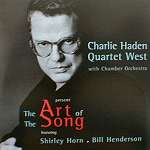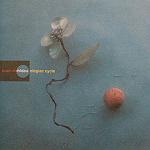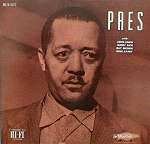Music Reviews
Jazz - Part 10 - November, 1999
Dennis Davis
Ratings: 
Extraordinary 
Good 
Acceptable 
Mediocre 
Poor

"The Art of the Song"
Charlie Haden Quartet West
Verve; 314-547-403-2
Performance: 
Audio: 
Charlie Haden�s Quartet West�s latest recording has something new: vocals. The Quartet West includes Charlie Haden on Bass, Alan Broadbent on piano, Ernie Watts on tenor saxophone, and Larance Marable on drums. Shirley Horn joins as vocalist on four selections, Bill Henderson on another four, and Haden makes his debut as a vocalist on one piece. All this is tied together with the backing of a 30 piece string chamber orchestra. Horn is a talented ballad singer who released many wonderful albums on the Mercury label in the 1960s and on the Steeple Chase label in the 1970s, but only reached a vast audience in the 1980s and 1990s with a long string of excellent and popular CDs on the Verve label. Henderson has never achieved similar mainstream success, although he has recorded to critical acclaim since the 1960s. He still performs regularly, mostly in the Los Angeles area.
I�m a big Haden fan and never fail to see him when he performs in the San Francisco area. I have tickets to see him perform at the San Francisco Jazz Festival with Horn and Henderson in a few weeks, and look forward to seeing how they sound unencumbered by the chamber orchestra. As much as I hoped for this record to succeed, I was disappointed at the disjointed feel of the project. The four Horn cuts are outstanding. I�ve never been a fan of Bill Henderson, and this record has not changed that opinion. Henderson has a very individual way of bending notes, but too often here he seems to just sing off key. The Quartet West frequently incorporates a film score feel in its records, but here the cinematic feel is taken to a whole new level because of the overwhelming string orchestra. The quartet shines through far too seldom. There are too many albums mixed in here, with a Shirley Horn album, a Bill Henderson album, a string orchestra film score, with occasionally a bit of Charlie Haden and the Quartet West showing through.
The album is well recorded as CDs go. However, the balance between the quartet and the string orchestra does not feel natural. Sometimes Haden is spotlighted in a way that is too forward, but then again, not keeping the orchestra back would have engulfed Haden�s Bass.
For reference, full track listing:
1. Lonely Town
2. Why Did I Choose You
3. Moment musical opus 16
4. In Love In Vain
5. Ruth�s Waltz
6. Scenes From A Silver Screen
7. I�m Gonna Laugh You Right Out Of My Mind
8. You My Love
9. Prelude en la mineur
10. The Folks Who Live On The Hill
11. Easy On The Heart
12. Theme For Charlie
13. Wayfaring Stranger
- DD -

"Elegiac Cycle"
Brad Mehldau
Warner Brothers; 9-47357-2
Performance: 
Audio: 
Mehldau is a young piano player in the Bill Evans and Keith Jarrett mold, who, beginning in 1993, released a steady stream of records in the trio and quartet format. In �Elegiac Cycle� he flies solo. All of the pieces are his own compositions. The extensive liner notes consist mostly of an extended essay by Mehldau on the nature of art, followed by a few quotations from Allen Ginsberg, William S. Burroughs, and Rainer Maria Rilke. Only by implication do the liner notes give any hint of what lies in the pits of the CD.
�Elegiac Cycle� is Mehldau�s attempt to meld jazz improvisation with the romantic sensibility of nineteenth century western classical music. True to the title of the release, each of the compositions (all by Mehldau) is mournful in feeling. The cycle is at times hauntingly beautiful. Whether Mehldau has succeeded in his goal or not is another matter. The music does not have the feel of improvised music. Instead, it sounds like a medley of romantic piano conventions, with occasional pop melodies intertwined. I found the compositions interesting, and I have tickets to hear Mehldau perform at the San Francisco Jazz Festival in a couple of weeks. I am not certain how often I will replay this CD in the long term. The sound is adequate studio sound, if a bit dry.
For reference, full track listing:
1. Bard
2. Resignation
3. Memory�s Tricks
4. Elegy for William Burroughs and Allen Ginsberg
5. Lament for Linus
6. Trailor Park Ghost
7. Goodbye Storyteller (for Fred Myrow)
8. Ruckblick
9. The Bard Returns
- DD -

"Pres"
Lester Young
Verve; POCJ-2728
Performance: 
Audio: 
This is a Japanese reissue by Polydor K. K., which used to reissue tons of jazz LPs. This record was originally released in 1951 as a 10� record by Mercury, reissued as a 10� record by Norgran, and then issued again as an LP in 1956 by Norgran. Norgran was Norman Granz�s record company prior to his founding of Verve Records. This record contains some of the finest recordings of Lester Young, one of the founding father�s of the tenor saxophone, as a leader. Young played with the early Count Basie band beginning in 1934, and accompanied Billie Holiday on many of her great sides. Along with Coleman Hawkins, Lester Young developed the tenor saxophone style. Hawkins used a full, rich style, while Young developed a lighter, vibrato-free style. Young clearly belongs in the top rung of the pantheon of jazz greats.
Young is accompanied here by Ray Brown (bass), Hank Jones (piano), and Buddy Rich (drums) on five numbers; Joe Shulman (bass), John Lewis (piano), and Bill Clark (drums) on three others; and John Lewis (piano), Jo Jones (drums), and Gene Ramey (bass) on four others. Five Young compositions are mixed in with standards. This is great music and belongs in every jazz lover�s collection. Music does not get any better than this -- it only gets different. Additionally, if you have not immersed yourself in Lester Young, you cannot fully appreciate the historical development of later �cool� stylists such as Stan Getz.
The recording quality, considering its age, is excellent. It sounds like a vintage recording, but not like an aircheck or bootleg. Granz did a decent job of recording artists, and the tape from which this CD was mastered appears to have held up well. Don�t pass up this record.
For reference, full track listing:
1. Up�n Adam
2. Too Marvelous For Words
3. �Deed I Do
4. Encore
5. Polka Dots and Moonbeams
6. Three Little Words
7. Neenah
8. Jeepers Creepers
9. Thou Swell
10. Undercover Girl Blues
11. Frenesi
12. Little Pee Blues
- DD -

� Copyright 1999 Secrets of Home Theater & High Fidelity
Return to Table of Contents for this Issue.

